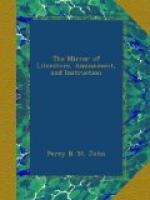Out of all the monks you could not pick a better fellow nor a merrier soul than Father Cuddy; he sang a good song, he told a good story, and had a jolly, comfortable-looking paunch of his own, that was a credit to any refectory table. He was distinguished above all the rest by the name of “the fat father.” Now there are many that will take huff at a name; but Father Cuddy had no nonsense of that kind about him; he laughed at it, and well able he was to laugh, for his mouth nearly reached from one ear to the other—his might, in truth, be called an open countenance. As his paunch was no disgrace to his food, neither was his nose to his drink. ’Tis a question to me if there were not more carbuncles upon it than ever were seen at the bottom of the lake, which is said to be full of them. His eyes had a right merry twinkle in them, like moonshine dancing on the water; and his cheeks had the roundness and crimson glow of ripe arbutus berries.
He eat, and drank, and prayed, and slept—what
then?
He eat, and drank, and prayed, and slept
again!
Such was the tenor of his simple life; but when he prayed, a certain drowsiness would come upon him, which it must be confessed never occurred when a well filled “black jack” stood before him. Hence his prayers were short, and his draughts were long. The world loved him, and he saw no reason why he should not in return love its venison and its usquebaugh. But, as times went, he must have been a pious man, or else what befel him never would have happened.
Spiritual affairs—for it was respecting the importation of a tun of wine into the island monastery—demanded the presence of one of the brotherhood of Innisfallen at the abbey of Trelagh, now called Muckruss. The superintendence of this important matter was committed to Father Cuddy, who felt too deeply interested in the future welfare of any community of which he was a member to neglect or delay such mission. With the morning’s light he was seen guiding his shallop across the crimson waters of the lake towards the peninsula of Muckruss, and having moored his little bark in safety beneath the shelter of a wave-worn rock, he advanced with becoming dignity towards the abbey.
The stillness of the bright and balmy hour was broken by the heavy footsteps of the zealous father: at the sound the startled deer, shaking the dew from their sides, sprang up from their lair, and as they bounded off, “Hah,” exclaimed Cuddy, “what a noble haunch goes there!—how delicious it would look smoking upon a goodly platter.”
As he proceeded, the mountain bee hummed his tune of gladness around the holy man, save when buried in the foxglove bell, or revelling upon a fragrant bunch of thyme; and even then the little voice murmured out happiness in low and broken tones of voluptuous delight. Father Cuddy derived no small comfort from the sound, for it presaged a good metheglin season; and metheglin he considered, if well manufactured, to be no bad liquor, particularly when there was no stint or usquebaugh in the brewing.




